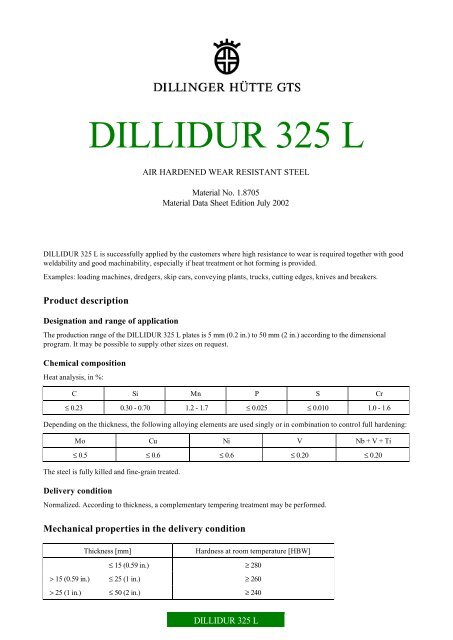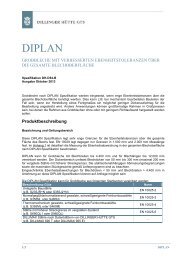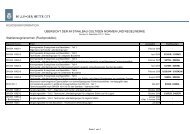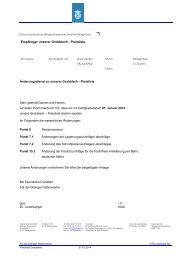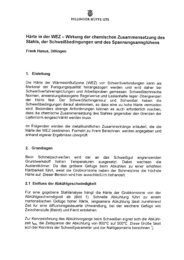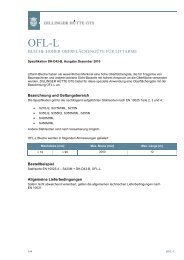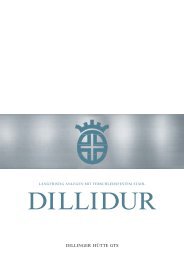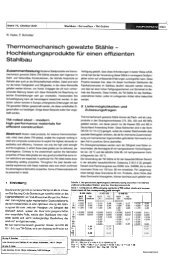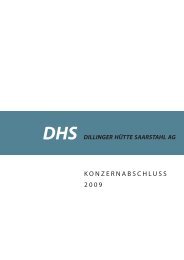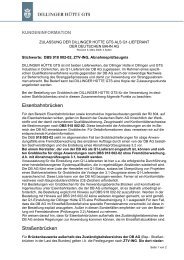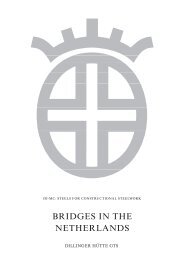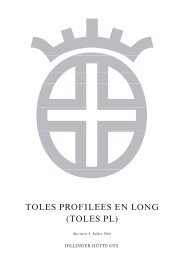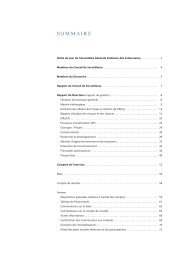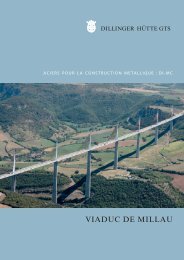DILLIDUR 325 L - Dillinger Hütte GTS
DILLIDUR 325 L - Dillinger Hütte GTS
DILLIDUR 325 L - Dillinger Hütte GTS
You also want an ePaper? Increase the reach of your titles
YUMPU automatically turns print PDFs into web optimized ePapers that Google loves.
<strong>DILLIDUR</strong> <strong>325</strong> L<br />
AIR HARDENED WEAR RESISTANT STEEL<br />
Material No. 1.8705<br />
Material Data Sheet Edition July 2002<br />
<strong>DILLIDUR</strong> <strong>325</strong> L is successfully applied by the customers where high resistance to wear is required together with good<br />
weldability and good machinability, especially if heat treatment or hot forming is provided.<br />
Examples: loading machines, dredgers, skip cars, conveying plants, trucks, cutting edges, knives and breakers.<br />
Product description<br />
Designation and range of application<br />
The production range of the <strong>DILLIDUR</strong> <strong>325</strong> L plates is 5 mm (0.2 in.) to 50 mm (2 in.) according to the dimensional<br />
program. It may be possible to supply other sizes on request.<br />
Chemical composition<br />
Heat analysis, in %:<br />
C Si Mn P S Cr<br />
≤ 0.23 0.30 - 0.70 1.2 - 1.7 ≤ 0.025 ≤ 0.010 1.0 - 1.6<br />
Depending on the thickness, the following alloying elements are used singly or in combination to control full hardening:<br />
Mo Cu Ni V Nb + V + Ti<br />
≤ 0.5 ≤ 0.6 ≤ 0.6 ≤ 0.20 ≤ 0.20<br />
The steel is fully killed and fine-grain treated.<br />
Delivery condition<br />
Normalized. According to thickness, a complementary tempering treatment may be performed.<br />
Mechanical properties in the delivery condition<br />
Thickness [mm] Hardness at room temperature [HBW]<br />
≤ 15 (0.59 in.) ≥ 280<br />
> 15 (0.59 in.) ≤ 25 (1 in.) ≥ 260<br />
> 25 (1 in.) ≤ 50 (2 in.) ≥ 240<br />
<strong>DILLIDUR</strong> <strong>325</strong> L
Auxiliary values for 10 mm (0.4 in.) plate thickness<br />
Hardness <strong>325</strong> HBW<br />
Tensile strength 1000 MPa (145 ksi)<br />
Yield strength 650 MPa (95 ksi)<br />
Elongation 13 % (l o = 5,65√S o , transverse specimen)<br />
Toughness Charpy-V- longitudinal specimens (10 mm x 10 mm)<br />
20 J (15 ft·lbf) at -20 °C (-4 °F)<br />
Testing<br />
Brinell surface hardness tested once per heat and 40 t.<br />
Identification<br />
The marking is carried out via steel stamps with at least the following information:<br />
• the manufacturer’s symbol<br />
• the steel designation (<strong>DILLIDUR</strong> <strong>325</strong> L)<br />
• the heat number<br />
• the rolled plate number<br />
Fabrication properties<br />
The entire fabrication and application techniques are of fundamental importance to the reliability of the products made<br />
from this steel. The fabricator should ensure that his calculation, design and fabricating methods are aligned with the<br />
material, correspond to the state-of-the-art that the fabricator has to comply with, and are suitable for the intended use.<br />
The customer is responsible for the selection of the material. The recommendations in accordance with EN 1011 should<br />
be observed.<br />
Flame cutting and welding<br />
General recommendations for welding of high strength steels are indicated in EN 1011. The carbon content of <strong>DILLIDUR</strong><br />
<strong>325</strong> L must be taken into account when compared with the grades of these recommendations.<br />
Additionally the following recommendations are to be considered:<br />
For flame cutting, a preheating temperature of at least 120 °C (250 °F) is recommended if plate thickness is greater than 10<br />
mm (0.39 in.).<br />
In case of high rigidity of structure, high weld metal hardness, unfavourable atmospheric conditions and generally for<br />
thicknesses > 8 mm (0.32 in.), a preheating temperature of 100 - 200 °C (210 - 390 °F) is recommended to reduce the risk of<br />
cracking in the welded joint. Welding consumables should be chosen as soft as the construction and wear conditions<br />
allow for it. The maximal working temperature is 300 °C (570 °F), for a short period.<br />
Cold forming<br />
Dillidur <strong>325</strong> L can be cold formed in spite of its high hardness. Grinding of the flame cut or sheared edges in the bending<br />
area is recommended to avoid crack initiation.<br />
The cold forming operations should be carried out under consideration of the following recommendations (where t is the<br />
plate thickness):<br />
Minimum bending radius Minimum die opening<br />
Transverse direction 5 t 14 t<br />
Longitudinal direction 6 t 16 t<br />
Hot forming and heat treatment<br />
The steel obtains its hardness by normalizing (air cooling from austenitizing temperature, if necessary with additional<br />
tempering). Consequently, there is no hardness drop after hot forming if temperature cycles equivalent to normalizing are<br />
applied, or if the hot forming process is followed by a normalizing heat treatment.<br />
Normalizing temperature: 920 - 970 °C (1690 - 1780 °F).<br />
If the plates are delivered normalized and tempered, the finished parts must be tempered again after hot forming in a<br />
temperature range of 550 - 600 °C (930 - 1110 °F). The steel can be heated to about 500 °C (930 °F) without any<br />
substantial drop in hardness.<br />
<strong>DILLIDUR</strong> <strong>325</strong> L
The following diagram shows the general changes in hardness or strength values according to the heat treatment<br />
temperature:<br />
Hardness [HBW] or Rm resp. Rp0,2 [MPa]<br />
Machining<br />
The steel can be machined with HSS-drills and especially with HSS-Co-alloyed drills with a satisfactory service life if the<br />
drill advance and cutting speed are correspondingly accommodated. Drilling with hard metal drills is not necessary.<br />
For milling and sawing, reversible carbide tips with a negative cutting edge are recommended.<br />
General technical delivery requirements<br />
Unless otherwise agreed, the general technical requirements in accordance with EN 10021 are applicable.<br />
Tolerances<br />
Unless otherwise agreed, the tolerances are in accordance with EN 10029, with class A for thickness.<br />
Surface quality<br />
Unless otherwise agreed, the provisions in accordance with EN 10163 are applicable.<br />
General note<br />
1200<br />
1000<br />
800<br />
600<br />
400<br />
200<br />
tensile strength<br />
yield strength<br />
hardness<br />
Auxiliary values for 10 mm plate thickness<br />
min. hardness in the delivery condition<br />
0<br />
0 100 200 300 400 500 600<br />
Tempering Temperature [°C]<br />
If for application or manufacturing reasons, particular requirements are demanded of the steel which are not covered in<br />
this data sheet, please contact us for special agreement prior to ordering.<br />
The indications in this data sheet are product descriptions. This data sheet is updated at irregular intervals. The latest<br />
version is available from the mill or as download at www.dillinger.de.<br />
For more information about application and machining of <strong>DILLIDUR</strong> <strong>325</strong> L, please refer to our technical publication<br />
"<strong>DILLIDUR</strong> - The concept to combat wear and tear".<br />
<strong>DILLIDUR</strong> <strong>325</strong> L
Sales organisations: Germany<br />
Vertriebsgesellschaft<br />
<strong>Dillinger</strong> <strong>Hütte</strong> <strong>GTS</strong><br />
Postfach 104927<br />
D-70043 Stuttgart<br />
Tel: +49 711 61 46-300<br />
Fax: +49 711 61 72 02<br />
AG der <strong>Dillinger</strong> <strong>Hütte</strong>nwerke<br />
Postfach 1580<br />
D-66748 Dillingen/Saar<br />
For your local representative<br />
please contact our coordination<br />
office in Dillingen<br />
Tel: +49 6831 47 23 85<br />
Fax: +49 6831 47 33 50<br />
e-mail: info@dillinger.de<br />
http://www.dillinger.de<br />
<strong>DILLIDUR</strong> <strong>325</strong> L<br />
France<br />
DILLING-<strong>GTS</strong> Ventes France<br />
Immeuble Pacific<br />
TSA 20002<br />
F-92070 La Défense CEDEX<br />
Tel: +33 1 41 25 87 28<br />
Fax: +33 1 41 25 86 77<br />
Tel: +49 6831 47-21 46<br />
Fax: +49 6831 47-30 89


